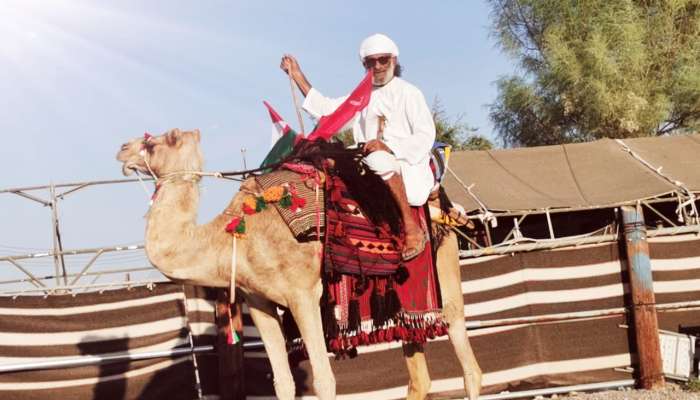
What time did you get up this morning? It’s the weekend, so you might be forgiven for sleeping in today. Not, though, if you are Ahmed Al Mahrouqi.
The 63-year-old Omani is currently leading an expedition on camelback from Adam to Muscat in an effort to prove that the old ways are best, and on this journey, will adopt a lifestyle similar to the ones his ancestors did.
“I also realised, in 2013, when I first began these trips, that a lot of people who were crossing the road or driving rashly, suffered many accidents, because of the high speed of vehicles,” says Ahmed. “My advice to the younger generation is to learn from their elders.
“Youngsters today sometimes recklessly drive at speeds of over 120 km/hr, as if they are in a great hurry to get somewhere, while their forefathers used to patiently go from place to place on a camel, journeys that took patience and planning,” he adds.
“We needed to do something to stop the accident rate. My first mission was undertaken to ask people to be calm and drive safely, but this particular journey I am on is to celebrate the 50th jubilee of Oman’s National Day,” he says.
Ahmed was born in Tanzania – a country that has long held familial, cultural, and social ties to Oman, well before diplomatic relations between the two countries first began. He moved to the Sultanate when he was just a boy of four or five, undertaking a voyage by ship that saw him enter the Gulf of Aden, before sailing past Salalah and parts of the central regions of the country, today known as the Governorate of Al Wusta.
It is fair to say that his journey to Arabia and the life he has had here since then have deeply coloured his opinions on how to live – for the better.
“Our ship stopped at Sur or Mahut, and from there, we had to travel to our village by camel,” he recalls. “My experiences with how my parents used to travel started early, so that gave me the idea for these journeys.
“I used to see camels carrying fish from Mahut to Adam, I have seen people go to Saudi Arabia from Oman to perform their Hajj,” he reveals. “I used to ask my grandfather where they were going, and the tradition of travelling by camel really amazes me. That, and our connection with other animals such as donkeys and horses.”
On this journey, Ahmed, who will be travelling with two other people, Danish travel blogger Rachel McIver, and fellow Omani Mohammed Al Jawhari, will practice self-sufficiency at both personal and communal level. Nature’s resources, he says, are not just meant for everyone to use, but have been given to us to share responsibly.
Food will be made in a kitchen that will be set up at camp and taken down before moving for the day. Ahmed and Co. and the two camels they’re with have risen early – just like his parents and grandparents did – so that they’re on the road by 7:30am, and have, on the course of this trip, covered an average of 30km a day.
“If you compare today with the way we lived in the olden days, previously, we used to exchange our items with others, and this helped all of us live together,” he says. “If I gave you potatoes, for example, you’d give me onions. In Oman, they used to employ this system. Now, all you need to do is order online and someone will come and deliver it to you.
“It is time to teach the youth of Oman to depend on themselves, and not rely on others to do things for them,” Ahmed says, a tone of finality in his voice. “There are actually a lot of younger people in Oman who are interested in discovering the way we used to do things earlier, because they have realised that those ways are healthy and sustainable. It makes us appreciate the things we have.” – [email protected]